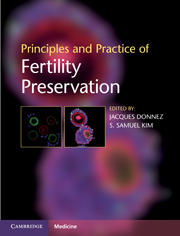Book contents
- Principles and Practice of Fertility Preservation
- Principles and Practice of Fertility Preservation
- Copyright page
- Dedication
- Contents
- Contributors
- Foreword
- Foreword
- Preface
- Acknowledgements
- Section 1 Introduction
- Section 2 Cancer biology, epidemiology and treatment
- Chapter 4 Basic cancer biology and immunology
- Chapter 5 Breast cancer and fertility preservation
- Chapter 6 Breast cancer therapy and reproduction
- Chapter 7 Pediatric cancer therapy and fertility
- Chapter 8 Cancer epidemiology and environmental factors in children, adolescents and young adults
- Section 3 Reproductive biology and cryobiology
- Section 4 Fertility preservation strategies in the male
- Section 5 Fertility preservation strategies in the female: medical/surgical
- Section 6 Fertility preservation strategies in the female: ART
- Section 7 Ovarian cryopreservation and transplantation
- Section 8 In vitro follicle growth and maturation
- Section 9 Future technologies
- Section 10 Ethical, legal and religious issues with fertility preservation
- Index
Chapter 6 - Breast cancer therapy and reproduction
from Section 2 - Cancer biology, epidemiology and treatment
Published online by Cambridge University Press: 04 February 2011
- Principles and Practice of Fertility Preservation
- Principles and Practice of Fertility Preservation
- Copyright page
- Dedication
- Contents
- Contributors
- Foreword
- Foreword
- Preface
- Acknowledgements
- Section 1 Introduction
- Section 2 Cancer biology, epidemiology and treatment
- Chapter 4 Basic cancer biology and immunology
- Chapter 5 Breast cancer and fertility preservation
- Chapter 6 Breast cancer therapy and reproduction
- Chapter 7 Pediatric cancer therapy and fertility
- Chapter 8 Cancer epidemiology and environmental factors in children, adolescents and young adults
- Section 3 Reproductive biology and cryobiology
- Section 4 Fertility preservation strategies in the male
- Section 5 Fertility preservation strategies in the female: medical/surgical
- Section 6 Fertility preservation strategies in the female: ART
- Section 7 Ovarian cryopreservation and transplantation
- Section 8 In vitro follicle growth and maturation
- Section 9 Future technologies
- Section 10 Ethical, legal and religious issues with fertility preservation
- Index
Summary
- Type
- Chapter
- Information
- Principles and Practice of Fertility Preservation , pp. 62 - 72Publisher: Cambridge University PressPrint publication year: 2011



